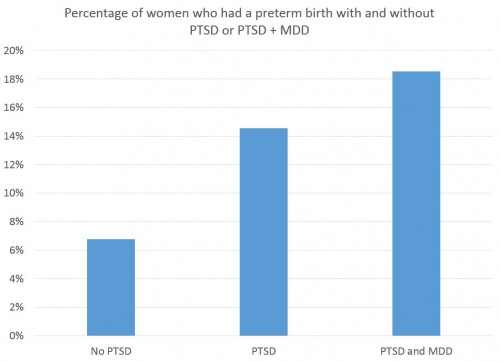We’ve discussed the high level of infant mortality in the US before. It’s real, and it’s not because of “definitions”. We’ve also discussed the fact that premature birth appears to be a real driver of this statistic. How to fix that is not as clear. But a new manuscript in JAMA Psychiatry brings come new data to the issue. “Pregnant Women With Posttraumatic Stress Disorder and Risk of Preterm Birth”
IMPORTANCE: Posttraumatic stress disorder (PTSD) occurs in about 8% of pregnant women. Stressful conditions, including PTSD, are inconsistently linked to preterm birth. Psychotropic treatment has been frequently associated with preterm birth. Identifying whether the psychiatric illness or its treatment is independently associated with preterm birth may help clinicians and patients when making management decisions.
OBJECTIVE: To determine whether a likely diagnosis of PTSD or antidepressant and benzodiazepine treatment during pregnancy is associated with risk of preterm birth. We hypothesized that pregnant women who likely had PTSD and women receiving antidepressant or anxiolytic treatment would be more likely to experience preterm birth.
DESIGN, SETTING, AND PARTICIPANTS: Longitudinal, prospective cohort study of 2654 women who were recruited before 17 completed weeks of pregnancy from 137 obstetrical practices in Connecticut and Western Massachusetts.
EXPOSURES: Posttraumatic stress disorder, major depressive episode, and use of antidepressant and benzodiazepine medications.
MAIN OUTCOMES AND MEASURES: Preterm birth, operationalized as delivery prior to 37 completed weeks of pregnancy. Likely psychiatric diagnoses were generated through administration of the Composite International Diagnostic Interview and the Modified PTSD Symptom Scale. Data on medication use were gathered at each participant interview.
The researchers followed a cohort of more than 2650 women in early pregnancy prospectively over time. The main exposures they were interested in were PTSD, major depression, and the use of sntidepressants or benzodiazapines. Analyses were conducted to see if factors were related to having a preterm delivery, defined as before to 37 weeks gestation.
The first level of the analysis found that women with PTSD were more likely to have a preterm birth. Next, they found that women with PTSD who also had a major depressive episode were even more likely to have a preterm birth. Women who had both had four times the odds of having a preterm birth. If I’m doing my math right, then it appears that 19% of all women who had no history of preterm birth, but who had PTSD and a major depressive disorder had a preterm birth during the study. About 15% of all women who had no history of preterm birth and had PTSD had a preterm birth during the study. Here’s a chart I made (constducted using all women in Figure 2):
Yes, women who were on antidepressents or benzodiazapines had the highest risk, but the risk for preterm birth was higher in women with PTSD/MDD independent of the use of these drugs. It appears that either stress or genetic factors related to these disorders could influence pregnancy. It’s worth further exploration.


